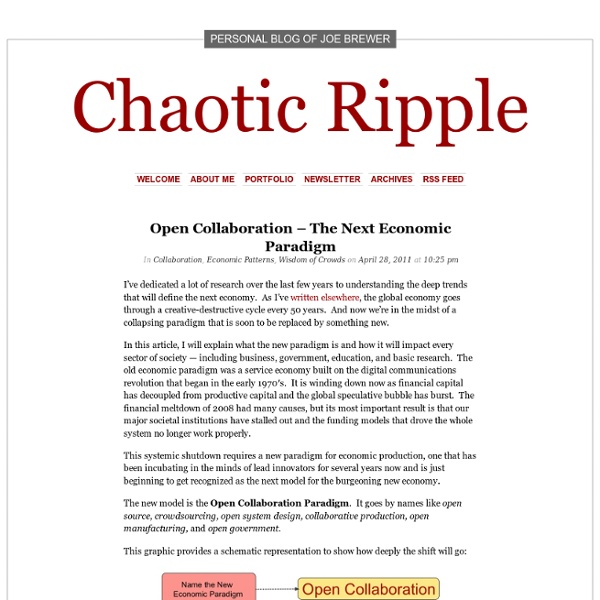Open Collaboration - The Next Economic Paradigm

Single Global Currency Association
Program in Open Innovation (formerly Center for Open Innovation)
Bitcoin : la monnaie virtuelle et décentralisée en questions
100 herramientas para invertir tu clase (para empezar)
Hemos actualizado el mapa de recursos para la flipped Classroom que ya presentamos en una entrada hace varias semanas. Si conocéis alguna herramienta interesante para cualquiera de los apartados contemplados, os agradeceremos que nos las indiquéis en el apartado de comentarios. Muchas gracias. Artículos relacionados <img src=" srcset=" 1x, 2x" width="500" height="383" alt="¿Cómo mejorar la evaluación de mis estudiantes?"
World debt comparison: The global debt clock
Microfinance and Microcredit Investment | Microcapital.org
Dispatches from the front lines of management innovation - McKinsey Quarterly - Strategy - Innovation
The Management Innovation eXchange (MIX) is a Web-based open-innovation project dedicated to catalyzing the creativity of thinkers and practitioners interested in reinventing management. That’s not an undertaking for any one individual or organization—it’s everybody’s problem, which is why the MIX is designed as a collaborative platform both to surface bold ideas and make progress on a set of make-or-break challenges. Earlier this year, the MIX introduced the first-ever management-innovation contest, the M-Prize, around three such challenges: redefining the work of leadership, increasing trust, and taking the work out of work. MIXers from all over the world contributed hundreds of entries. Few of the submissions are world changing, some are half baked, and a couple are truly off the wall. But so many of them are bold and original, sometimes even audaciously imaginative, that they confirm our deeply held belief that everyone wins when everyone shares. Increasing trust at Microsoft
Isaac Mao
Isaac Mao Isaac Mao (simplified Chinese: 毛向辉; traditional Chinese: 毛向輝; pinyin: Máo Xiànghuī) is a Chinese venture capitalist, software architect, and social media researcher. He is also known for co-founding CNBlogs.org, doing research in social learning and for developing the philosophy of Sharism. He is the director of the Social Brain Foundation,[1] a vice president of the United Capital Investment Group[2] (2004-2008) and a fellow at the Berkman Center for Internet and Society. Life and work[edit] Mao is a venture capitalist, blogger, software architect, entrepreneur and researcher in learning and social technology. Blogging and blog advocacy[edit] Mao is a co-founder of CNBlogs.org and a co-organizer of the Chinese Blogger Conference (2005 in Shanghai, 2006 in Hangzhou).[5] He started a movement in 2005 to adopt Chinese bloggers on overseas servers. References[edit] External links[edit]
5 hacks para aprender um novo idioma melhor e mais rápido - Galileu | Life Hacks
Você certamente já ouviu que aprender um novo idioma, principalmente depois de adulto, é mais difícil. Isso porque a plasticidade do nosso cérebro já não é mais a mesma. De acordo comRobert Bley-Vroman, em seu livro Linguistic Perspectives on Second Language Acquisition, encaramos o aprendizado como uma forma de resolver problemas, diferentemente de crianças quando aprendem a se comunicar. Mas isso não significa que tudo está perdido. E, falando em motivação, separamos hacks que podem potencializar seu aprendizado. 1. A ideia é revisar as coisas que você aprendeu em intervalos determinados. O diagrama abaixo mostra como a repetição pode ajudar a reverter a curva de esquecimento natural: Um app que te ajuda na questão da repetição espaçada é o Duolingo. 2. Quando você dorme, o cérebro transfere parte de suas memórias de curto prazo para um "arquivo", onde são armazenadas suas lembranças. 3. Muitas escolas de idiomas ensinam lições de gramática e interpretação de texto. 4. 5.
ECONOMY PROFESSOR |
Related:
Related:



